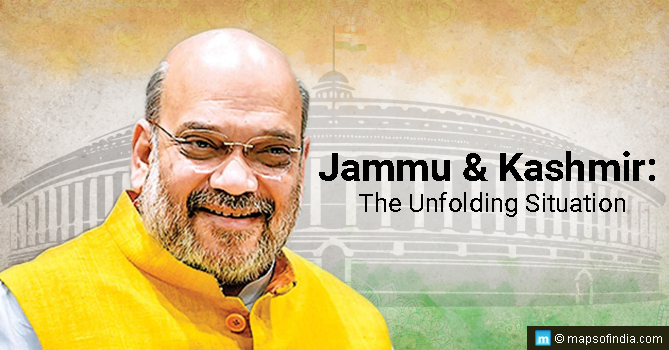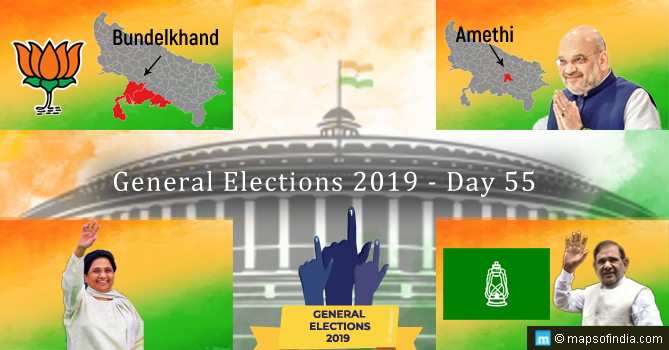
In a dramatic turn of events, the Minister of Home Affairs, Amit Shah, announced in the Rajya Sabha today, August 5, 2019, a few minutes after 11 a.m. that the Union government will be introducing four Bills on Jammu and Kashmir (J&K) at once.
Prior to this, additional paramilitary forces were deployed in Jammu & Kashmir on Saturday, August 3 and Sunday, August 4, 2019 amid rumours circulating on social media about the security build up being in preparation for impending administrative changes in Kashmir. The process of placing Kashmir political leaders under house arrest also started on August 5 midnight, as per a tweet of Omar Abdullah, former Chief Minister of Jammu & Kashmir. Apart from Abdullah, the other leaders are Mehbooba Mufti and Sajjad Lone.
Moreover, Section 144 CrPC was imposed in Srinagar from August 5 midnight, and all educational institutions were asked to close. Even Jammu came under the ambit of Section 144 CrPC later on Monday, August 5 morning. Mobile and internet services were suspended in the valley and Jammu region, and NIT students were also advised to leave the state.
Scrapping special status through Article 370 and 35A
A Union cabinet meeting was called at 9.30 a.m., which was to be followed by parliamentary proceedings at 11 a.m. Around 11.17 a.m., while speaking in the Rajya Sabha, Amit Shah moved a resolution that special status granted to Jammu and Kashmir under Article 370 of the Constitution be revoked. Article 370 empowers Jammu and Kashmir to draft its own constitution and take decisions in all matters barring defence, communications and foreign affairs. This caused immediate mayhem in the Rajya Sabha.
Bifurcation of state into 2 UTs: Jammu and Kashmir and Ladakh
Amit Shah also announced the decision of the government to bifurcate the state into two Union Territories (UTs) through Jammu and Kashmir Reorganisation Bill – Jammu and Kashmir (which will have a legislature), and Ladakh (which will be without a legislature). At present, it does not have an elected government and is under President’s rule. Its day-to-day affairs are being looked after by the governor Satya Pal Malik. After receiving nod in the Rajya Sabha, the bill will be presented in the Lok Sabha tomorrow.
Further, through the Presidential Order titled The Constitution (Application to Jammu and Kashmir) Order 2019, dated August 5, 2019, Article 367 has been amended. The amendment to Article 367 lays down interpretation rules for provisions in the Constitution pertaining to Jammu & Kashmir. The President, instead of issuing a Presidential order under Article 370(3), issued a Presidential order under Article 370(1).
The Presidential order dated August 5, 2019 states that everything in the Indian Constitution will apply to J&K and the term ‘Constituent Assembly’ in Article 370 (3) has been changed to ‘Legislative Assembly’. This will allow the President to repeal the provision with the concurrence of the Legislative Assembly of Jammu & Kashmir. Also, the consent of the governor for any move is considered sufficient in the absence of the Legislative assembly.
Article 370 was included in the Constitution on October 17, 1949, and exempted J&K from the Indian Constitution (except Article 1 and Article 370 itself). It permitted the state to draft its own Constitution, and restricted Parliament’s legislative powers in respect of the state. A Presidential Order in 1954 introduced Article 35A. Article 35A flows from Article 370 and empowers the J&K legislature to define the state’s permanent residents and their special rights and privileges. Hence, Article 35A can also be repealed now.
10% EWS quota in education and jobs
J & K Reservation (Second Amendment) Bill, 2019 was the second bill to be passed in the Rajya Sabha this morning. This bill provides up to 10% quota for Economically Weaker Sections (income below Rs 8 lakhs) in educational institutions and government employment in the state of J&K, in addition to existing reservations.
Meanwhile, Indian Army, Air Force and Delhi Metro have been put on high alert.
Who supports Kashmir move?
Welcoming the government’s “historic” decision on scrapping Article 370 of the Constitution, which grants special status to the state, the J&K unit of the BJP welcomed the government’s “historic” decision and said that people were thankful to PM Narendra Modi for “mitigating their pain”.
Veteran BJP leader LK Advani termed the government’s decision to revoke Article 370, as a bold step towards strengthening national integration.
Former Finance Minister Arun Jaitley also took to twitter to say: “A historical wrong has been undone today. Article 35A came through the back door without following the procedure under Article 368 of the Constitution of India. It had to go.”
Not to be left behind, Aaditya Thackeray said on twitter: “I pray that now with the reorganisation of Jammu, Kashmir & Ladakh, the citizens there will benefit with peace, progress and prosperity, which was being held back from them for years due to its isolation from the rest of the country.” He also tweeted pictures of celebrations outside Shiv Sena Bhavan in Mumbai.
Meanwhile. BSP, AAP, AIADMK, TDP, BJD & YSRCP also announced support for the BJP government move on Article 370 in the Rajya Sabha. Satish Chandra Mishra, BSP MP, said in Rajya Sabha: “Our party gives complete support. We want that the Bill be passed. Our party is not expressing any opposition to Article 370 Bill & the other Bill.”
Similarly, BJD MP Prasanna Acharya announced in Rajya Sabha, “In real sense today, Jammu & Kashmir has become a part of India. My party supports this resolution. We are a regional party but for us nation is first.” AAP chief and Chief Minister of Delhi Arvind Kejriwal also came out in support of the resolution, stating that the party hopes “this will bring peace and development in the state”.
Who is opposing Kashmir move?
However, his former ally and erstwhile AAP member, Yogendra Yadav, was not happy with the government’s decision. He expressed apprehension on twitter: “Today’s decision violates all the principles invoked by Vajpayee: insaniyat, jamhuriat, kashmiriyat. This unconstitutional move plays into the hands of separatists and Pak sponsored terrorists, besides reneging on the idea of India and the promise to the people of Kashmir.”
Likewise, BJP ally, JDU, also opposed the move and staged a walkout. JDU leader KC Tyagi announced the reasons for not supporting the resolution: “Our chief Nitish Kumar is carrying forward the tradition of JP Narayan, Ram Manohar Lohia and George Fernandes. So our party is not supporting the Bill moved in the Rajya Sabha today. We have different thinking. We want that Article 370 should not be revoked,”
Issuing a strong statement, former chief minister of Jammu and Kashmir and National Conference leader Omar Abdullah (who is under house arrest) termed the govt’s move to revoke Article 370 as a betrayal of trust of people of the Valley, which will have ‘far reaching and dangerous’ consequences. Calling it “Unilateral, illegal and unconstitutional…,” he said, “a long and tough battle lies ahead.”
Lawyer, former Union Minister, and senior Congress leader P Chidambaram lamented that the move will lead to the disintegration of India. “The govt has illegally disintegrated J&K…this will set a precedent and allow the govt to disintegrate any state as per its will and we will not stand by this,” he says. ” Shameful that you have turned J&K into a non-entity by making a Lt Governor there, so that you can appoint even a peon or a clerk, sitting here (Delhi). “Another senior Congress leader Ghulam Nabi Azad felt that the government has wiped out Jammu and Kashmir’s identity.
Derek O’Brien, Rajya Sabha member and national spokesperson of Trinamool Congress had this scathing comment: “Trinamool is against the Constitutional immorality and ‘procedural harakiri’ committed today.”
Samajwadi Party (SP) has also opposed the bill.





